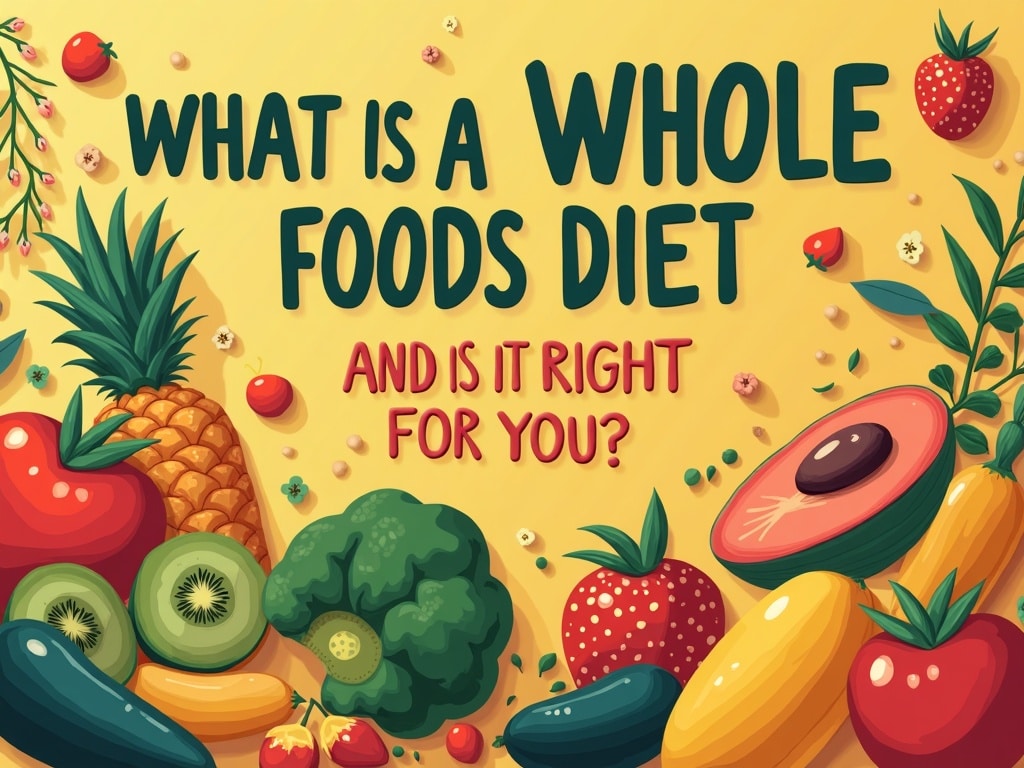What is a Whole Foods Diet and Is It Right for You?
Imagine walking through a sun-drenched farmers market, overflowing with vibrant fruits, vegetables, and grains. That's the essence of a whole foods diet – embracing foods in their natural, unprocessed state. But what does this entail exactly, and is it a sustainable path to better health for everyone?
The term whole foods diet might conjure images of an expensive grocery store chain, but it’s actually a dietary philosophy centered on consuming foods that are minimally processed and as close to their natural form as possible. It's less about strict rules and more about making conscious choices to prioritize nutrient-dense foods over those laden with additives, refined sugars, and unhealthy fats. Let's dive into the details.
Defining the Whole Foods Diet: Back to Basics
At its core, a whole foods diet emphasizes:
- Unprocessed or Minimally Processed Foods: Think fresh fruits, vegetables, whole grains, legumes, nuts, and seeds.
- Limited Refined Sugars and Grains: Reducing or eliminating white bread, pastries, sugary drinks, and other sources of empty calories.
- Healthy Fats: Prioritizing sources like avocados, nuts, seeds, olive oil, and fatty fish.
- Lean Protein: Including sources like poultry, fish, beans, lentils, and tofu.
- Avoidance of Artificial Additives: Steering clear of artificial sweeteners, colors, flavors, and preservatives.
It's important to note that a whole foods diet isn't necessarily vegetarian or vegan, although it can be adapted to fit those lifestyles. The focus is on the quality and source of the food, rather than adhering to a specific label. It's also worth pointing out that there isn’t one single, universally accepted definition of whole foods, which allows for flexibility and personalization.
The Potential Health Benefits: Nourishing Your Body from the Inside Out
Adopting a whole foods diet can offer a wide range of potential health benefits, stemming from the abundance of nutrients and the absence of harmful additives. While individual results may vary, research suggests several advantages:
- Improved Heart Health: Whole foods are naturally low in saturated and trans fats and rich in fiber, which can help lower cholesterol levels and reduce the risk of heart disease.
- Weight Management: The high fiber content of whole foods promotes satiety, helping you feel fuller for longer and potentially reduce overall calorie intake.
- Reduced Risk of Type 2 Diabetes: Whole grains and other whole foods help regulate blood sugar levels, reducing the risk of insulin resistance and type 2 diabetes.
- Enhanced Digestion: The fiber in whole foods promotes healthy digestion and can prevent constipation.
- Increased Energy Levels: By providing your body with essential nutrients, a whole foods diet can lead to sustained energy levels throughout the day.
- Reduced Risk of Certain Cancers: Studies have linked diets rich in fruits, vegetables, and whole grains to a reduced risk of certain types of cancer.
Furthermore, many people report feeling more energetic, experiencing clearer skin, and enjoying improved mental clarity when they switch to a whole foods diet. These anecdotal benefits highlight the holistic impact of nourishing your body with wholesome foods.
What to Eat on a Whole Foods Diet: A Colorful Plate
Building a whole foods pantry and meal plan is easier than you might think. Here are some staples to include:
- Fruits: Berries, apples, bananas, oranges, melons, grapes, etc.
- Vegetables: Leafy greens (spinach, kale, lettuce), broccoli, carrots, peppers, tomatoes, onions, garlic, etc.
- Whole Grains: Brown rice, quinoa, oats, barley, whole-wheat bread (look for 100% whole wheat), etc.
- Legumes: Beans (black beans, kidney beans, chickpeas), lentils, peas, etc.
- Nuts and Seeds: Almonds, walnuts, chia seeds, flax seeds, sunflower seeds, etc.
- Healthy Fats: Avocados, olive oil, nuts, seeds, fatty fish (salmon, tuna, mackerel), etc.
- Lean Protein: Poultry (chicken, turkey), fish, beans, lentils, tofu, eggs, etc.
A typical day on a whole foods diet might look like this:
- Breakfast: Oatmeal with berries and nuts, or a whole-wheat toast with avocado and egg.
- Lunch: A large salad with grilled chicken or tofu, mixed vegetables, and a vinaigrette dressing, or a lentil soup with a side of whole-grain bread.
- Dinner: Baked salmon with roasted vegetables and quinoa, or a stir-fry with brown rice, tofu, and plenty of vegetables.
- Snacks: Fruits, vegetables with hummus, nuts, or seeds.
The key is to focus on building meals around whole, unprocessed ingredients. Don't be afraid to experiment with different flavors and cuisines to keep things interesting. Remember, the goal is to create a sustainable and enjoyable eating pattern.

Foods to Limit or Avoid: Steering Clear of Processed Pitfalls
While a whole foods diet isn't about strict restriction, it's helpful to be aware of foods that are best limited or avoided. These often contain high amounts of refined sugars, unhealthy fats, and artificial additives:
- Sugary Drinks: Sodas, juice drinks, sweetened teas, and energy drinks.
- Processed Snacks: Chips, cookies, candy, and other packaged snacks.
- Refined Grains: White bread, white rice, and pastries made with white flour.
- Fried Foods: French fries, fried chicken, and other deep-fried items.
- Processed Meats: Bacon, sausage, hot dogs, and deli meats.
- Artificial Sweeteners: Aspartame, sucralose, and other artificial sweeteners.
- Excessive Alcohol: While moderate alcohol consumption may be acceptable for some, excessive intake should be avoided.
Reading food labels is crucial for identifying hidden sugars, unhealthy fats, and artificial additives. Be mindful of serving sizes and prioritize ingredients you recognize.
Potential Downsides and Considerations: Is It Right for You?
While a whole foods diet offers numerous potential benefits, there are also some potential downsides and considerations to keep in mind:
- Cost: Whole, unprocessed foods can sometimes be more expensive than processed alternatives.
- Time Commitment: Preparing meals from scratch can require more time and effort than relying on convenience foods.
- Accessibility: Access to fresh, whole foods may be limited in some areas, particularly in low-income communities.
- Potential Nutrient Deficiencies: If not carefully planned, a whole foods diet can lead to nutrient deficiencies, such as vitamin B12 (especially for vegans) or iron.
- Social Challenges: It can be challenging to maintain a whole foods diet in social situations, such as parties or restaurants.
It's important to address these potential challenges by planning meals in advance, shopping strategically, and supplementing with essential nutrients if necessary. Consulting with a registered dietitian or healthcare professional can help you create a personalized whole foods diet that meets your individual needs and preferences.
Tips for Transitioning to a Whole Foods Diet: Making Sustainable Changes
Switching to a whole foods diet doesn't have to be an all-or-nothing proposition. Here are some tips for making sustainable changes:
- Start Small: Gradually incorporate more whole foods into your diet, rather than making drastic changes overnight.
- Focus on One Meal at a Time: Begin by focusing on making one meal a day a whole foods meal, such as breakfast or lunch.
- Plan Your Meals: Plan your meals in advance to avoid impulsive choices and ensure you have the necessary ingredients on hand.
- Shop Strategically: Shop at farmers markets and grocery stores that offer a wide selection of fresh, whole foods.
- Cook at Home: Cooking at home allows you to control the ingredients and portion sizes in your meals.
- Read Food Labels: Become a savvy label reader to identify hidden sugars, unhealthy fats, and artificial additives.
- Find Support: Connect with friends, family members, or online communities who are also following a whole foods diet for support and encouragement.
- Be Patient and Persistent: It takes time to develop new habits, so be patient with yourself and celebrate your progress along the way.
The Bottom Line: A Path to Health and Well-being
A whole foods diet is more than just a trendy eating plan; it's a philosophy that emphasizes nourishing your body with wholesome, unprocessed foods. While it requires commitment and planning, the potential health benefits are significant, ranging from improved heart health and weight management to increased energy levels and a reduced risk of chronic diseases.
By making conscious choices to prioritize whole foods, you can empower yourself to take control of your health and well-being. So, take a step back from the processed aisles and explore the vibrant world of whole foods – your body will thank you for it.

